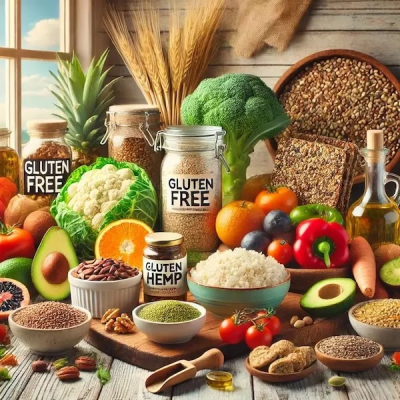How to enrich a gluten-free diet? Try hemp foods!
Author: Jakub Dufek
A gluten-free diet is often followed not only by people with celiac disease or gluten intolerance (which is a protein found in grains). The interest in gluten-free food is also growing among those who want to improve their digestion, reduce inflammatory reactions, or support overall health. In this article, we will focus on how to enrich a gluten-free diet and recommend suitable hemp foods!
What is a gluten-free diet?
A gluten-free diet excludes all foods containing gluten, a protein found in three main grains: wheat, rye, and barley.
For people with celiac disease, consuming gluten is a serious health issue as it can damage the small intestine and lead to long-term health complications. On a gluten-free diet, people need to find alternative nutrient sources that are both safe and nutritionally valuable.
Celiac disease vs. gluten allergy
As mentioned earlier, gluten-free diets are mainly followed by people suffering from celiac disease and gluten allergies. Let's clarify the key difference:
Celiac disease is an autoimmune disorder where gluten consumption damages the small intestine and disrupts nutrient absorption, potentially leading to severe health issues. It requires a lifelong gluten-free diet.
In contrast, a gluten allergy is a typical allergic reaction in which the immune system overreacts to gluten, causing acute symptoms such as rashes, swelling, or breathing difficulties. While it doesn’t damage the intestine, it can trigger severe allergic reactions, including anaphylaxis, and requires avoiding gluten, just like in celiac disease.
What to eat on a gluten-free diet?
The most common gluten-free foods include:
- Fruits and vegetables: Naturally gluten-free and full of nutrients.
- Meat and fish: Fresh meat, poultry, and fish do not contain gluten (beware of marinades and flavored products).
- Eggs: A safe and nutritious part of the diet.
- Dairy products: Milk, cheese, yogurt—plain and without added thickeners.
- Legumes: Beans, lentils, and peas are great sources of protein and fiber.
- Rice, potatoes, and corn: Basic starches suitable for a gluten-free diet.
- Buckwheat, quinoa, amaranth: Naturally gluten-free grains that can replace wheat.
- Hemp products: Hemp seeds, hemp protein, and hemp oil are gluten-free and nutritious foods suitable for daily use.
- Nuts and seeds: A great source of healthy fats and proteins.
It is also important to choose packaged foods labeled "gluten-free" and check labels on processed products, as gluten can be present in some sauces, thickeners, or seasonings.
How can hemp foods help with a gluten-free diet?
Hemp foods are an excellent source of nutrients that are naturally gluten-free. Some of the most popular hemp products include hemp seeds, hemp protein, and hemp oil, all of which can easily be incorporated into a gluten-free diet.
- Hemp seeds – Small but highly nutritious. Hemp seeds are rich in omega-3 and omega-6 fatty acids in an ideal ratio, providing a good amount of protein and fiber essential for healthy digestion.
- Hemp protein – Naturally gluten-free, hemp protein is a great alternative to traditional protein powders like whey. It contains all nine essential amino acids, making it a complete protein source.
- Hemp oil – This oil is rich in unsaturated fatty acids and vitamins. It is ideal for cold dishes like salads and can also promote overall skin health, a benefit for people with celiac disease who may experience dermatological issues related to nutrient deficiencies.
How to incorporate hemp foods into your day?
Not sure how to include hemp foods into your gluten-free day? Here are some simple recipes to inspire you:
Breakfast:
- Smoothie with hemp protein
Ingredients: Banana, a handful of spinach, a handful of fruit, a tablespoon of hemp protein, almond milk.
Why: Hemp protein provides essential amino acids and energy for the whole morning. It's easily digestible and naturally gluten-free.
Or
- Gluten-free oatmeal with hemp seeds
Ingredients: Gluten-free oats, almond milk, a teaspoon of honey, a tablespoon of hemp seeds.
Why: Hemp seeds add healthy fats and protein for a great start to the day.
Lunch:
- Salad with hemp seeds and chicken
Ingredients: Mixed greens, grilled chicken breast, avocado, a tablespoon of hemp seeds, dressing from olive and hemp oil.
Why: Hemp seeds are a great source of protein and healthy fats that complement a light and healthy salad.
Dinner:
- Gluten-free pasta with hemp seed pesto
Ingredients: Gluten-free pasta, pesto made from basil, garlic, olive oil, and hemp seeds.
Why: Hemp seeds in the pesto provide healthy fats and protein to complement the carbs from gluten-free pasta.
Evening Snack:
- Hemp tea
Why: Hemp tea has calming effects and is great for the evening. It helps with relaxation and promotes sleep.
More Handy Tips:
- Hemp protein: Add it to smoothies, oatmeal, or homemade gluten-free baked goods as a source of protein.
- Hemp seeds: You can sprinkle them on salads, oatmeal, yogurts, or even gluten-free bread.
- Hemp oil: Use in cold dishes like salad dressings or on crackers and vegetables.
All recipes can be found in our hemp recipes collection.
This meal plan is rich in nutrients and provides excellent sources of energy, protein, and healthy fats without containing gluten. Hemp products are easily digestible and promote overall health, making them perfect for anyone on a gluten-free diet.
How many hemp food should I eat daily?
It depends on the product you choose. For hemp seeds, one tablespoon per day is recommended; for protein, 1-2 scoops daily; and for hemp oil, one tablespoon daily.
The products can be combined.
Most common questions about the gluten-free diet
- What contains gluten?
Gluten is found in wheat, barley, and rye, but also in many processed foods like sauces, soups, sweets, and even some supplements. Therefore, it is important to carefully read labels and choose only products labeled "gluten-free." - Can I eat oats?
Oats are naturally gluten-free, but they are often contaminated with gluten during processing. Therefore, it's essential to look for oat products labeled "gluten-free." - Are hemp foods safe for a gluten-free diet?
Yes! Hemp products, such as seeds, oil, and protein, are naturally gluten-free and can be a great dietary supplement, providing protein, healthy fats, and fiber. - How do I know if a product is gluten-free?
Gluten-free products must meet strict standards and contain less than 20 ppm of gluten. Look for certifications or "gluten-free" labels on the packaging.
Conclusion
A gluten-free diet can be challenging for many people, but with the right approach and the selection of suitable foods, it is possible to maintain a balanced and varied diet. Hemp foods are a great addition as they offer many nutritional benefits that can support health in any condition. If you are looking for foods that are naturally gluten-free, nutritious, and easy to incorporate into your daily life, be sure to try hemp seeds, protein, or oil.



